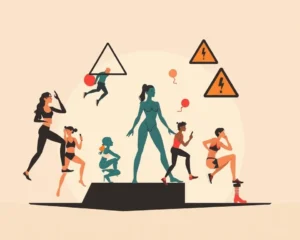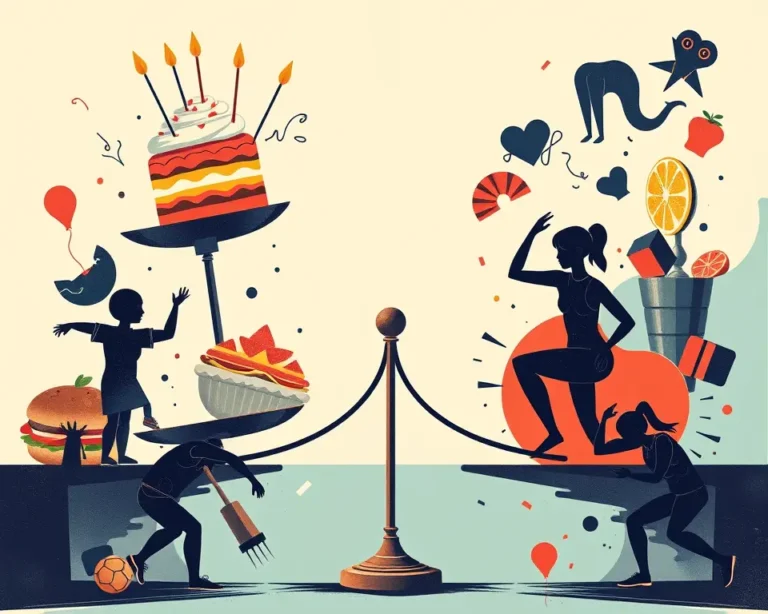It’s tempting to celebrate weight loss milestones with a treat, but a fitness coach has warned against it, likening it to rewarding sobriety with alcohol. This approach can reinforce unhealthy habits and sabotage your progress. So, how can you celebrate success without derailing your health goals? Let’s explore effective strategies and “cheat codes” to help you achieve sustainable weight loss.
Why Rewarding Weight Loss with Food Backfires
The brain’s reward system is intricately linked to our eating habits. Consistently using food as a reward strengthens neural pathways, making it difficult to break the cycle. This is particularly problematic during weight loss, where careful calorie management is crucial. As one behavioral scientist explains, “The psychological connection between achievement and food rewards creates a counterproductive cycle during weight loss efforts.”
Rewarding weight loss with food can lead to:
- Emotional Eating: Relying on food for comfort or celebration can blur the lines between genuine hunger and reward-seeking behavior.
- Inconsistent Caloric Intake: Food rewards often involve high-calorie treats, making it challenging to maintain a consistent calorie deficit.
- Hedonic Hunger: Decoupling achievements from food helps reduce cravings driven by pleasure rather than physiological need.
- Sabotaged Progress: The very act of rewarding with food can undermine the hard work you’ve put in to lose weight.
The Power of Non-Food Rewards
The good news is that research suggests replacing food rewards with meaningful alternatives can enhance motivation and long-term success. Non-food rewards activate dopamine-driven behavior loops that strengthen positive habits, creating neural pathways that make these actions increasingly automatic over time.
Psychological Benefits
- Reduced Hedonic Hunger: By decoupling achievements from food, you gradually reduce cravings driven by pleasure rather than physiological need.
- Enhanced Habit Reinforcement: Consistently pairing healthy behaviors with meaningful rewards creates neural pathways that make these actions increasingly automatic over time.
- Improved Emotional Regulation: Alternative rewards provide healthy outlets for managing stress, celebrating achievements, and processing emotions without caloric consequences.
Types of Non-Food Rewards
- Self-Care: Indulge in activities that promote relaxation and well-being, such as a spa day, a massage, or a long bath.
- Experiences: Celebrate with memory-making moments like a sunset nature walk, a concert, or a weekend getaway.
- Tangible Rewards: Treat yourself to something you’ve been wanting, such as new workout clothes, a book, or a piece of jewelry.
- Fitness-Related Rewards: Invest in items that support your fitness journey, such as a fitness tracker, new running shoes, or home gym equipment.
- Personal Growth: Sign up for a class or workshop, learn a new skill, or dedicate time to a hobby you enjoy.
- Visual Progress Documentation: Take weekly progress photos to create tangible evidence of non-scale victories, reinforcing your achievements.
- Mindfulness activities: Schedule dedicated time for meditation sessions or relaxing nature walks, which research shows can reduce stress-related eating urges.
- DIY self-care treatments: Create home spa experiences with bubble baths, face masks using household ingredients, or dedicated relaxation time.”
- Digital “achievement unlocked” systems: Create personal milestone charts where you can visually track accomplishments and progress.
Fitness Coach’s “Cheat Codes” for Weight Loss
Beyond rewards, fitness coaches often share practical strategies to accelerate weight loss. Here are some common “cheat codes” that can help you stay on track:
1. Hydrate Strategically
- Drink Water Before and After Meals: This improves feelings of fullness, helping you eat less.
- Drink Half Your Body Weight in Ounces of Water Each Day: Keeping a water bottle with you can help maintain this habit.
- Salty Hydration: Add a pinch of real sea salt to your morning water to help hydrate your body and replenish essential minerals and electrolytes.
2. Embrace the 80/20 Diet
- Focus on Nutrient-Dense Foods: Get 80% of your calories from whole, unprocessed sources like fruits, vegetables, lean proteins, and whole grains.
- Allow for Flexibility: The other 20% can be whatever you want, allowing you to enjoy treats in moderation without feeling deprived.
3. Move After Meals
- Walk After Each Meal: This improves feelings of fullness and aids digestion.
- Increase Daily Steps: Aim for a daily step goal to boost calorie burning and overall activity levels.
- Incorporate Activity into Your Day: Walk instead of driving when possible, take the stairs, and find opportunities to move throughout the day.
4. Prioritize Protein
- Boost Protein Intake: Add protein sources like egg whites, cottage cheese, or chicken breast to your meals.
- Eat Protein with Every Meal: Protein is essential for muscle maintenance and satiety, helping you feel full and reducing overall calorie intake.
5. Manage Hunger
- Be Okay with Going to Bed a Little Hungry: This can be a sign that fat loss is happening.
- Fiber at Every Meal: Mahtab aimed for 25–35 grams daily, incorporating fruits like apples and pears, as well as edamame, lentils, and whole-grain bread.
- Cut out empty calories and fill up on healthy snacks: Stewart recommends removing sugary drinks from your diet, which have more of an impact than you might think.
6. Mindful Eating
- Eat Vegetables First: Followed by protein, and then carbohydrates. This order helps regulate blood sugar levels, reduces cravings, and stabilizes energy throughout the day.
- Chew Food Slowly Until It Becomes Liquid:
- Eat Until Satisfied, Not Stuffed
7. Other Strategies
- Prepare all your meals in advance: Taking the extra time to prepare your meals on the weekend will set you up for a happy and healthy week—and encourage you to avoid unhealthy temptations.
- Sunshine start: Prioritise morning sunlight exposure. Natural light enhances mental clarity, boosts mood, and improves focus throughout the day while also aiding sleep at night.
- Caffeine delay: Delay caffeine intake for two hours after waking up, ideally until after your first meal. This practice helps avoid energy crashes later in the day and supports the natural regulation of cortisol and adenosine levels.
- Mild Stressors: Include mild stressors, like cold showers or intense workouts, in your regular routine. They can enhance cellular health and slow down the aging process.
- Fasting benefits: Incorporate intermittent fasting (16+ hours) into your routine to trigger autophagy—a process that repairs cells and removes dead proteins—potentially preventing diseases like cancer.
- Vegetable day: Set aside a day or two when you will consume nothing but vegetables
- Soup day: Give yourself a day or two with only soups that require no chewing
- Steamed or poached fish: Any kind of fish, including shellfish, works wonders in nudging our body fat along and those omega-3 oils help everything
- Hard-boiled eggs: Skip this method if you have a dangerously high cholesterol condition but for most of us, a day or two on even a large number of eggs won’t have any permanent effects on our cholesterol levels.
Creating Your Own Weight Loss Rewards System
To create a strategic rewards system that propels you toward your goals:
- Choose Both Small and Large Rewards: Small rewards can be used for short-term milestones, while large rewards are reserved for longer-term achievements.
- Track Your Progress Diligently: Use a fitness app or journal to monitor your journey and stay motivated.
- Celebrate Your Achievements: Pair your rewards with positive self-talk to reinforce the good feelings around your healthy behaviors.
- Personalize Your Rewards: What feels rewarding to one person may not feel rewarding to another. Choose rewards that align with your interests and values.
- Schedule Your Rewards: Research suggests a balanced approach with three tiers of rewards: small daily or weekly acknowledgments for consistent healthy behaviors, moderate rewards for monthly achievements, and significant rewards for major milestones.
The Role of a Weight Loss Coach
A weight loss coach provides guidance, support, and accountability as you strive to reach your fitness goals. They can help you:
- Set Realistic Goals: A coach can help you define achievable weight loss goals based on your individual circumstances.
- Develop Customized Plans: Coaches create tailored nutrition and exercise plans that align with your preferences, lifestyle, and health needs.
- Provide Education: Coaches offer valuable insights into nutrition, fitness, mindfulness, and behavior change strategies.
- Monitor Progress: Coaches track your progress through body measurements and other metrics, providing feedback and support along the way.
- Overcome Obstacles: Coaches help you navigate challenges, such as plateaus or setbacks, and adjust your plan as needed.
Final Thoughts
Rewarding weight loss with food can be a slippery slope. By shifting your focus to non-food rewards and implementing practical “cheat codes,” you can create a sustainable and enjoyable weight loss journey. Remember, consistency is key, and celebrating your successes in healthy ways will reinforce positive habits for lasting results.







